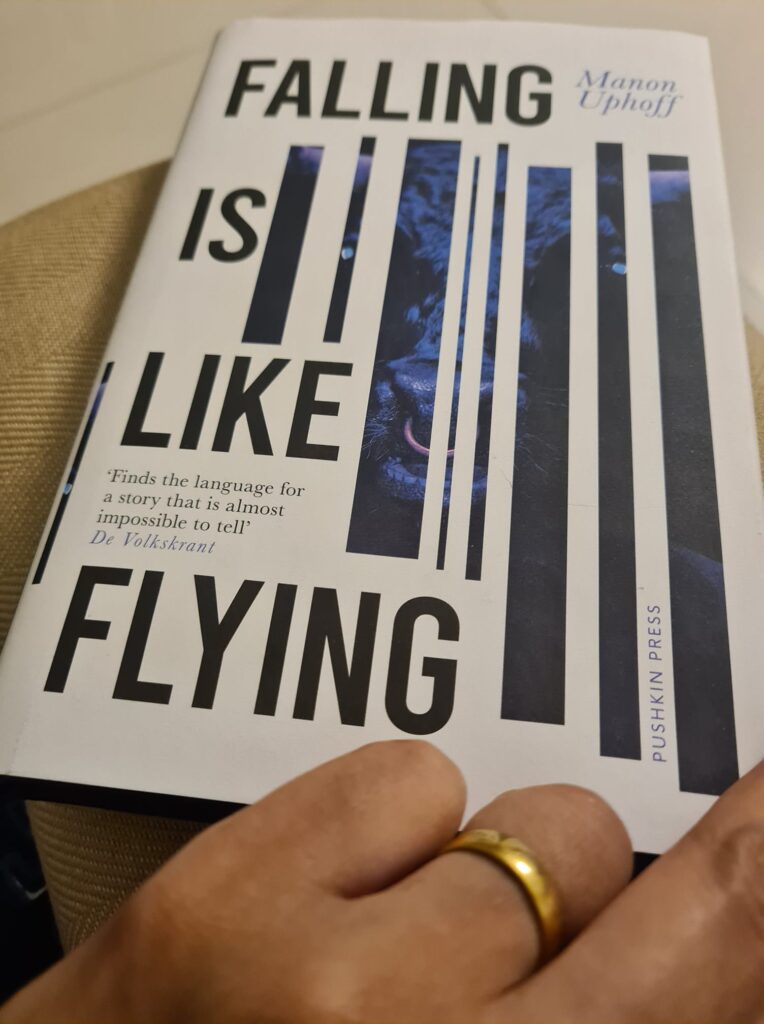Manon Uphoff’s “Falling is like Flying”

Manon Uphoff’s Falling is like Flying is her first book translated from Dutch into English and published by Pushkin Press. The translator is Sam Garrett. This book of hers is autobiographical to the extent that she documents her childhood, the trauma she and her other twelve siblings faced with the Minotaur ( her father), her resilience and the magnificent ending in a gathering of the sisters ( “the witches’ sabbath”) reminiscing before they returned to their respective homes:
“Then it’s home again, home again astride the broom-mobile where we put on our disguises of writer, artist, housewife, single parent, senior citizen of independent means.”
It is a powerful account of a violent and abusive home. Uphoff began recalling details on the day her eldest sister died. It was an upwelling of painful memories that could not be suppressed any more. Her story had to be told.
“Excuse me for going on about myself for so long. I feel as though I need to tell you what I was and what I wanted to be, before descending step by step to the first place I ever lived. Of which I was reminded in those cheerless days when the beat of an old, familiar drum grew louder and louder.
Yes, turmoil, and alarum. . . . and then ignition.”
In the book, the most horrific incidents are never explicitly described but there are references made to them. Also, Uphoff relies extensively on literary references, including in the naming of some of her siblings, almost as if she is distancing herself to a few degrees from her memories. It may be a literary device that she uses to her advantage in telling her story but this act of the narrator distancing themselves at the precise moment of recounting a traumatic incident is a defense mechanism found often in survivor’s testimonies. They usually speak on the third person but Uphoff chooses to speak via a range of literary frameworks. Even so, the power of the storytelling or the incidents she narrates are not diminished. Parts of the book are vile and nauseating to read. At times, I had to put the book down as it was becoming difficult to read and I would discover that I was holding my breath. So much violence perpetrated constantly within the “safe” confines of a family home are despicable. Even offering the rationale at the beginning of the book that Uphoff’s father had been born in 1914 and grew to adulthood during the two world wars, is insufficient reason for the abuse he perpetrated upon his young family. The only time Manon Uphoff confronted her mother about the truth regarding the Minotaur especially since she had been plagued by terrifying nightmares; her mother’s response was to collapse on tears and never again was the topic ever broached.
Uphoff asks the reader helplessly,
“So tell me. What’s a girl got to do?”
In Uphoff’s case, she writes. She wrote this book. There is so much to unpack in “Falling is Like Flying”. A memoir. A devastating story about child abuse. Patriarchy at its worst on display. A dysfunctional family where some of the children went on to replicate some of it in their lives as well. The fact that Uphoff has the insight and literary knowhow to tell an extremely personal and difficult story makes this book an absorbing read. The triumphant ending where she upturns many of the preconceived notions about women using terminology such as witches that are usually hurled as slurs by society ( and was often used to describe her eldest sister), Uphoff reclaims for herself and her sisters a space and identity. The siblings speak frankly about the abuse they faced and agree to gather every year for a meal on their father’s death anniversary. It is a very liberating act to break these shackles. Life will never repair the physical and mental trauma that this family has to live with, but they can certainly begin to heal.
This is an unforgettable book. Slim. Excruciatingly painful to read in parts.
Read it you must.
17 Oct 2022

No Comments